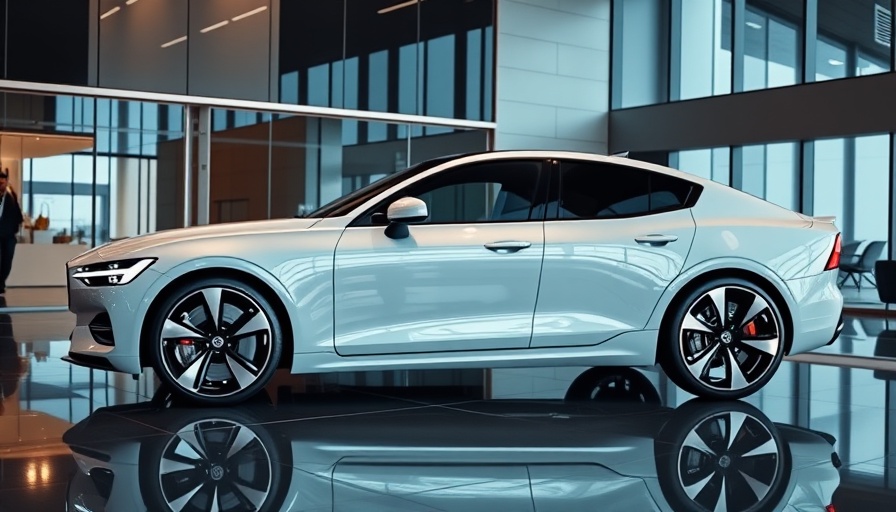
Polestar's Ascent Amid Tesla's Trouble: What's Happening?
The Swedish electric vehicle (EV) maker Polestar is making waves in the automotive world, reporting a remarkable 76% surge in global deliveries recently. This growth is significantly attributed to customers disillusioned with Tesla, particularly during a time when Tesla's reputation is facing multiple challenges. As a strategic move, Polestar has launched an aggressive discount campaign specifically targeting unhappy Tesla owners, offering discounts that can reach as high as $20,000.
The Conquest Campaign: Driving Tesla Owners to Polestar
In the first quarter of 2025, nearly half of all Polestar 3 sales in the U.S. stemmed directly from this tactic, according to Polestar’s U.S. Head of Sales, Jordan Hofmann. The company has strategically devised this campaign to capitalize on the discontentment surrounding Tesla, which is grappling with declining sales and stock prices amid concerns of leadership controversies and market perception. As EV enthusiasts reconsider their brand loyalties, Polestar's offer not only lowers the cost of transitioning to a new vehicle but also positions itself as a viable alternative. For instance, a top-tier Polestar 3, regularly priced at about $93,000, can drop to $73,000 for former Tesla owners.
Market Implications: The Impact of Tariffs and Competition
The demand for EVs has typically been on the rise, but the current market conditions are compounded by fears of increasing prices due to proposed higher tariffs on imported vehicles. This has compelled various automakers to implement price strategies that appeal to potential buyers scrambling to make a purchase ahead of these changes. Polestar is not alone in this race; competitors like Ford and Stellantis are also rolling out similar discount initiatives, attempting to stake their claim in a fiercely competitive market. The focus on maintaining production stability in the U.S. has become ever-more critical, especially following shifts in international trade regulations under the previous administration.
What Makes Tesla Vulnerable?
Tesla's management under Elon Musk has faced backlash due to several factors, including perceived leadership missteps and shifts away from a once-strong customer-centric approach. Over the past year, Tesla’s stock has plummeted by 32%, which starkly contrasts with Polestar’s recent surge in interest. High profile trade-ins and customer dissatisfaction feed into this narrative, suggesting that the allure of a superior product may no longer be sufficient to hold Tesla's market position.
The Strategy of Targeted Discounts: Benefits and Risks
Polestar's marketing strategy employs targeted discounts as a method of conquest, which historically can yield significant returns for automakers. Simply put, this strategy invites disgruntled consumers to reconsider their choices while potentially alienating loyal Tesla supporters. By promoting a high-value offer alongside proactive customer engagement, Polestar has positioned itself as not just a competitor, but a worthy alternative. However, this strategy has its risks; deep discounts could devalue the brand's image and may lead to a race-to-the-bottom pricing tactic that many in the automotive industry seek to avoid.
Future Predictions: Is This a Sustainable Strategy?
As Polestar pushes forward with its discount campaigns, the question remains: is this approach sustainable in the long run? Analysts agree that while Polestar's current popularity may be in part due to Tesla’s woes, building brand loyalty requires a commitment beyond temporary motivation. Future growth will rely heavily on production capacity and the quality of service provided by Polestar’s dealerships.
The Possible Domino Effect: A Shifting EV Landscape
As the landscape of electric vehicles continues to evolve, the implications of Polestar's strategies might affect not just Tesla, but the entire EV market. If other automakers see success in targeting dissatisfied customers, we could witness a broader shift in how companies attract and retain their consumer base.
Conclusion: The Call for Policymaker Awareness
With shifts in customer behavior and emerging market trends, more informed purchasing choices are becoming a priority for consumers. As automakers vie for a position in the market, it becomes essential for policymakers to consider the implications of tariff-related decisions on the automotive industry as a whole. With Polestar and competitors stepping up to meet market demands, consumer interests must remain at the forefront, advocating for a balance between competitive pricing and quality service in an evolving industry.
 Add Row
Add Row  Add
Add 




 Add Row
Add Row  Add
Add 

Write A Comment